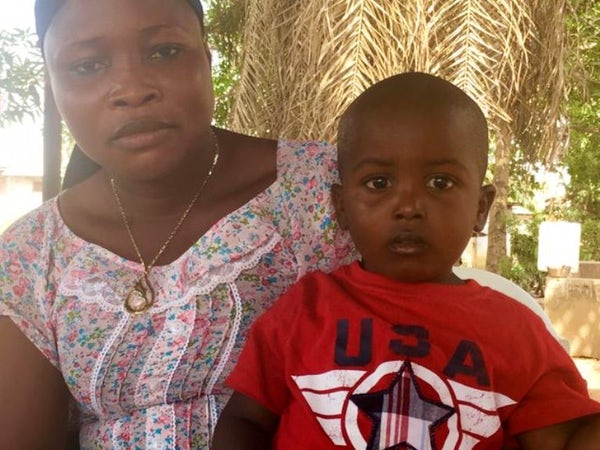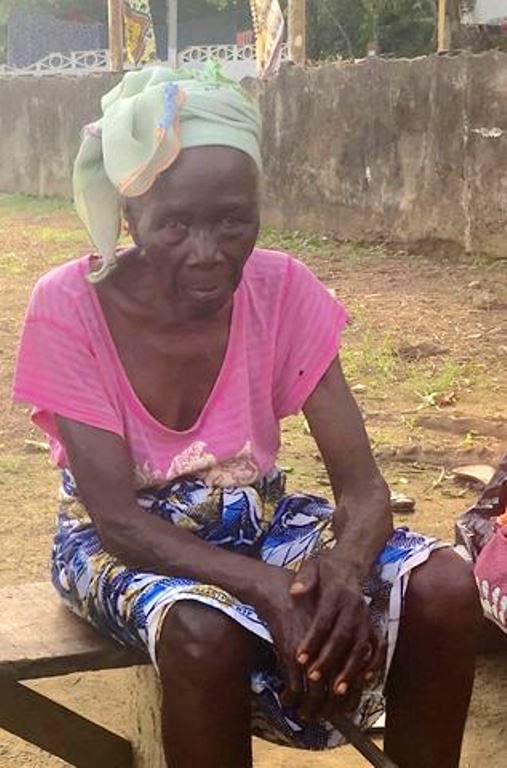The Ebola outbreak in West Africa was first reported in March 2014 and went on to become the deadliest ever outbreak of the disease, with around 28,637 reported cases. By the time the World Health Organization declared the region Ebola-free in January 2016, almost two years after the first confirmed case, more than 11,300 people had died of Ebola in six countries – Liberia, Guinea, Sierra Leone, Nigeria, the U.S. and Mali.
Liberia was the last country to be declared free of the virus.
Angie Dennis, 27
In November 2014, Angie Dennis was admitted to an Ebola treatment unit (ETU) in Monrovia with a high viral load. “I could feel in myself that I was going to die,” she says.
Angie is warm and articulate, and makes friends quickly. When she was in hospital, she found solace in a nascent friendship with another patient. “We made friends inside the ETU,” she says. “We’d go and sit in the sun and talk.”
But her friend deteriorated, and Angie watched her die, sitting by her side through frightening hemorrhagic symptoms. “At that point, I started breaking down,” she says. “I lost hope.”

After surviving Ebola, Angie Dennis lost friends and fought stigma, but she says she is finally at peace with what happened. (Katherina Thomas)
A hygienist working in the treatment unit begged Angie not to give up her fighting spirit, and after two weeks, she tested negative. “They said my case was a miracle,” she says. “A doctor said, ‘Wow, this girl who was rushing here, almost to a point of death, she’s recovering.’”
But the fight wasn’t over. Angie had nightmares, seeing “flashes of the doctors in their PPE,” meaning the personal protective equipment they wore to protect themselves from the virus. And there are physical reminders of what she’s been through: In hot weather, her eyes itch and burn – symptoms of post-Ebola syndrome – but it took her months to seek treatment because she was afraid of returning to a clinical setting and reliving the trauma.
Ultimately, it was another friendship that got her through. “It was very hard to process all that, but I have this very good friend of mine, her name is Tina,” says Angie. “She was always there for me. When she would see me thinking about the trauma, she would come and say, ‘Let’s go to the beach.’ Now I don’t have nightmares; I accept what happened.”
Bendu Kromah, 35
Bendu, from St. Paul River Bridge, Liberia, lost 13 close family members to Ebola. But she also gained one, taking in 2-month-old baby Jusufu, the orphan who made headlines when he became the youngest Ebola survivor in Liberia.
“My grandma died first, and then my mother, plus my oldest brother, my sister-in-law and their children,” Bendu says. “Every morning I used to go the ETU. When I’d get there they’d say, ‘Today another person in your family has died.’”
With few family members left to comfort her, Bendu says she didn’t know where to turn. She shut down emotionally, walking around as if in a daydream. “I could be walking across the street and a car would blow its horn and I wouldn’t even notice,” she says.

In 2014, Bendu fostered baby Jusufu, Liberia’s youngest Ebola survivor. He is now almost 3 years old. (Katherina Thomas)
Jusufu’s mother was related to Bendu’s sister-in-law. When both women died and Jusufu survived the disease himself, Bendu stepped up to foster him. “He was just two months old when his ma died,” she says. “He was just crying, crying. They say he was sucking on her breast when she died.”
Bendu now raises Jusufu alongside her own three children. She doesn’t have a steady job, relying on selling goods at the market to get by. NGOs helped with food and other items for Yusufu, but the aid was only short term. Bendu admits there were times when she ran out of milk and would have to “just lay him down and stuff him with water so he could sleep.”
Jusufu is now 3 years old, and Bendu has since married. “He calls me ‘Mama’ and he calls my husband ‘Papa,’” she says.
Nelly Cooper, 53
At the height of the outbreak, as the head of West Point Women for Health and Development Organization, Nelly led a team of over 200 community workers who joined other responders in door-to-door Ebola awareness efforts in West Point, Liberia’s largest slum.
The crisis has ended, but Nelly’s work continues. “After the Ebola crisis, we are still talking about other related problems,” she says.

Women’s rights activist Nelly Cooper continues to tackle post-Ebola issues from her office in West Point slum. (Katherina Thomas)
Nelly’s team offers counseling to the caretakers of Ebola orphans. “There is sometimes discrimination against Ebola orphans when a caretaker already has their own children,” she says. “Those [orphans] can feel out of place. We have been giving psychological support” to the orphans and their caretakers.
Nelly also works towards gender equality in West Point, educating women and men about the dangers of domestic violence and sexual abuse, supported by her husband whom she said “always encourages” her. “Behind every successful woman there is a good man,” she says.
“Old Ma” Bendu Fofee, 90
When her daughter-in-law Daba became sick with Ebola in June 2014, “Old Ma” Bendu Fofee offered her own mat as a bed. But Daba’s condition worsened, and she died while waiting for an ambulance.
“After the people carried Daba away, I took back my mat and I carried it to the waterside to go wash it,” Old Ma says. “I planned to reuse it. I didn’t know she was suffering from that particular virus.”

Almost three years ago, “Old Ma” Bendu Fofee risked her life for an act of kindness. (Katherina Thomas)
A health worker explained to Old Ma that she would have to be monitored for Ebola symptoms. “The people said I was going to have something called quarantine,” she says.
She spent three weeks inside her house. During that time, she says, she “worried a lot” about the consequences of her gesture of kindness.
“If, God forbid, I hear of another Ebola outbreak in Liberia, it will be better for me to just sit alone,” she says, smiling. “I will not want to go near anybody or do anything like that again.”
